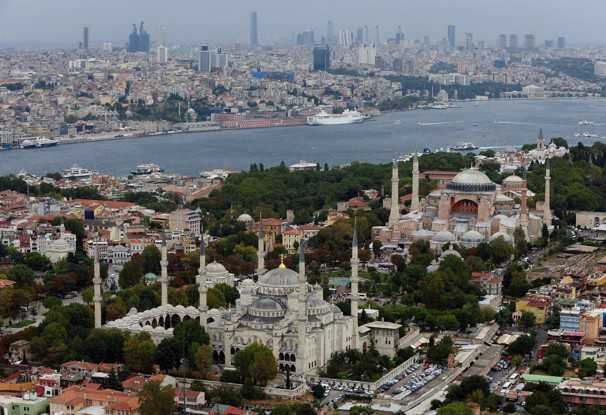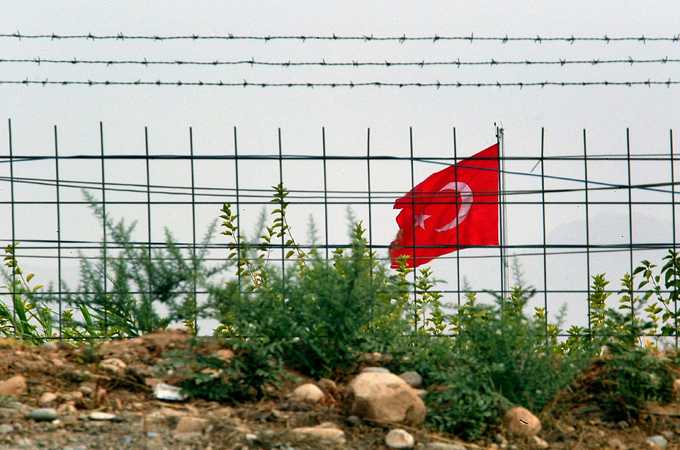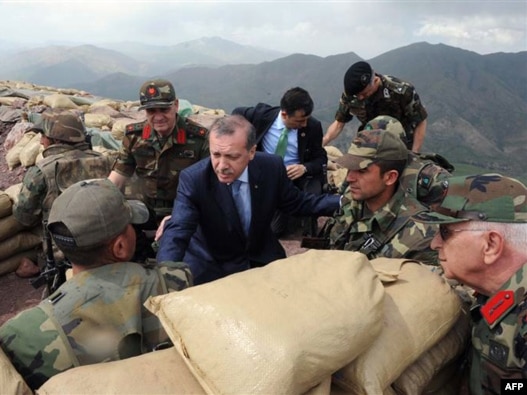By MARC CHAMPION And ERKAN ÖZ
ISTANBUL—Turkey’s escalating battle with Kurdish insurgents has become caught up in the country’s fiercely partisan domestic politics, as the government charged Tuesday that opponents of democratic change had triggered ethnic riots at both ends of the country.
Justice Minister Sadullah Ergin said Tuesday that intelligence services were investigating whether two episodes of unrest Monday had been engineered. In eastern Turkey, suspected guerrillas (sic.) from the Kurdish Workers Party, or PKK, killed four policemen, triggering riots. In Turkey’s west, riots that followed a knife fight involving ethnic Kurds left dozens injured and detained.
“In both cases we have to take into account the probability of provocations, and the intelligence services are investigating these probabilities,” Mr. Ergin told a group of reporters in Istanbul, through simultaneous translation.
Turkey is in the midst of a power struggle between its Islamic-leaning government and the military-backed, secularist establishment that effectively ruled the country for decades. Conspiracy theories abound on both sides about the machinations of the other, and are impossible to prove.
However, the accusation that members of Turkey’s so-called deep state are fueling conflict with the PKK in an effort to undermine trust in the government is explosive. Turkey’s war with the PKK has cost 30,000 to 40,000 lives since it began in 1984.
Mr. Ergin declined when asked to name who he suspected of provoking Monday’s riots, but he said they were groups “who favor the status quo” in Turkey. Those groups, he said, were trying to block the government’s efforts at democratization, including a referendum on constitutional amendments to be held Sept. 12.
The proposed changes to the basic law, which would remake the country’s top courts and subject the military to civilian law, could significantly alter the balance of power in the government’s favor.
The PKK stepped up attacks in the spring after their jailed leader, Abdullah Ocalan, said he was calling off talks with Turkey’s government, explaining that Ankara’s stated goal of improving conditions for Turkey’s large Kurdish minority was going nowhere.
From the outset, columnists in Turkey’s pro-government media speculated that the PKK’s move was being orchestrated with deep state members in an effort to discredit the government and unseat the AKP. Hundreds of Turkish bureaucrats, journalists and military officers are currently awaiting trial as alleged deep-state conspirators in proceeding that opponents see as a witch hunt.
On Monday, the pro-government daily Bugün published the transcript of a wiretapped phone conversation from 2007, in which two men the newspaper identified as Turkish air force officers discussed whether to eliminate or relocate an unmanned aerial vehicle that was flying over eastern Turkey to spot PKK terrorists, because “There were casualties in the last event, I received serious pressure because of this.”
The two men don’t mention the PKK, but the context of the conversation suggests they are talking about enabling Kurdish attacks.
The General Staff issued a statement confirming that an investigation into the wiretapped phone call was started in 2007. The statement didn’t deny the authenticity of the transcript, but denied the probe had been delayed on purpose. The statement said voice analysis that would match the recording with the suspected officers had yet to be done.
Another pro-government newspaper, Vakit, last week published a picture of Murat Basbug, the son of Turkey’s Chief of the General Staff Ilker Basbug, posing with a convicted PKK member. The newspaper said the picture was one of many of the two young men together.
In a separate statement, the General Staff acknowledged the authenticity of the photograph of Murat Basbug, which Vakit said was found at the apartment of convicted PKK member Hasan Lala when he was arrested on April 9, 2009. The statement said the picture was taken at a casual meeting of friends and that facts cited in the Vakit story were “lies.” The statement didn’t specify which facts were inaccurate.
On Monday, riots left dozens detained and police cars burned just outside Bursa, a city of two million south of Istanbul with a Kurdish population of about 300,000. The riots followed a knife attack by a group of ethnic Kurds on non-Kurds, after which a crowd surrounded the police station where the attackers were being held.
The riots were the result of disappointment over the government’s failed Kurdish initiative, said Ayla Yildirim, chairwoman of the Kurdish Peace and Democracy Party, or BDP, in Bursa.
Also Monday, rioters set fire to the BDP office in Hatay province, on Turkey’s border with Syria, after suspected PKK fighters killed four policemen, according to Anadolu Ajansi, the state news agency. There, too, a crowd surrounded the police station, this time on incorrect rumors that three suspects were being held inside.
“It’s like somebody pushed the button, we see those kind of events all over the country,” said Ms. Yildirim.
Write to Marc Champion at marc.champion@wsj.com and Erkan Oz at erkan.oz@dowjones.com
https://www.wsj.com/articles/SB10001424052748703292704575393233492763798, JULY 28, 2010






 Turkish Prime Minister Tayyip Erdogan (center) talks with Turkish soldiers in a trench during his visit to the Turkish city of Hakkari on the border with Iraq on June 20.
Turkish Prime Minister Tayyip Erdogan (center) talks with Turkish soldiers in a trench during his visit to the Turkish city of Hakkari on the border with Iraq on June 20.